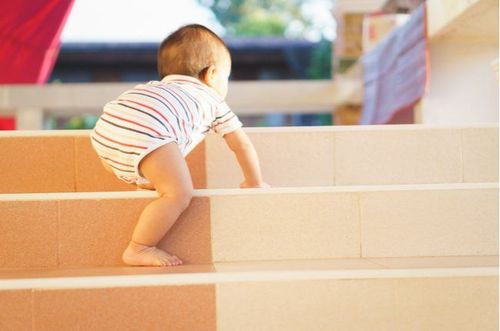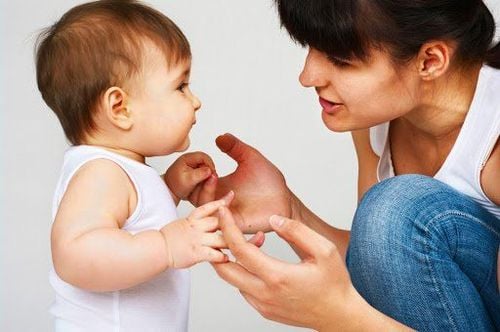This is an automatically translated article.
The article is professionally consulted by Master, Doctor Dang Huy Toan - Department of Pediatrics - Neonatology - Vinmec Nha Trang International General Hospital
When children are young, every day that passes is exciting in their little world. Your 14-month-old baby may be learning to run or still taking their first steps. There will be falls, slips and somersaults as a child's motor coordination takes a long time to perfect.
Instead of worrying, mothers should have words of encouragement with children, so that children can confidently develop daily. Check out the tips below to take care of your 14-month-old baby more holistically.
1. Sleep in 14-month-old babies
Now the 14-month-old baby's sleep quality has begun to stabilize and gradually follow the cycle. Babies will still sleep about 14 hours a day, but their sleep cycles will change to help them sleep better, especially in the middle of the night. Children may suddenly wake up when stimulated by noises, discomfort in the body or dream of something. Once the baby has established the habit of deep and steady sleep at this time, it is easier for the mother to do other chores and feel more time for herself.
2. Care for a 14-month-old baby
14-month-olds should eat 3 meals a day consisting of the main food groups with a few snacks and about 400ml of milk. Mothers can give their babies milk directly, cook with food, mix with cereals. Some mothers worry that their child is not eating enough, but even if the child eats very little, it still provides enough nutrients for the child to develop well, so the mother does not need to stress about the child's eating. At this point, the child can already eat the same foods as everyone in the family in smaller portions.
Example: A child weighing about 10 kg needs an average of 950 calories per day and will have about 370 calories from milk (breast milk, cow's milk or formula), the remaining 580 calories coming from main meals and sub-day. Mothers do not necessarily calculate exactly, enough calories for children, but the important thing is that children grow and gain weight steadily. Parents should check the child's height and weight regularly, monitor the child's growth chart, and if any abnormality is found in the child, the thing to do at this time is to consult a pediatrician and specialist. nutritionist.

Chất lượng giấc ngủ của trẻ 14 tháng tuổi đã bắt đầu ổn định và dần theo chu kỳ
3. Development in 14-month-old babies
3.1 Moving By 14 months, babies are probably used to crawling, crawling and even learning to walk. But what if your child isn't ready to take those big steps on his own yet? You'll worry that your baby may be stunted, but don't know what the warning signs are. Most babies learn to walk between 12 and 15 months, but some still can't walk at 16 months or later. Genetics, determination, body type and experience are all factors that can affect a child's ability to walk on his own at this age.
For example, if your baby likes to crawl, he may not feel the need to walk because crawling serves his need to move well. You can encourage your baby to get up and learn to walk by placing their toys a little higher, so that they can reach for a table or chair to reach them. Mother should always encourage, encourage, give the baby cheering smiles in the process of learning to walk, this will also promote the baby to walk faster.
Especially when your baby is 18 months old and still can't walk, is slow to walk, or in the toddler stage where he likes to walk on one leg, limp, or walk only on his toes for a long time. You should see and discuss this with your pediatrician.
3.2 Senses, Communication, and Emotions At the age of 14 months, babies are hyperactive and naughty. You may experience situations such as a child removing a diaper and playing with stools. This is a normal but very messy and frustrating stage of development in toddlers and will usually pass by the time they are 2 years old (fortunately not all babies are). In addition, “biting” and “beating” are common annoying behaviors in children of this age. This could simply be that the child is experimenting, or the child is using these actions to deal with feelings of fear, frustration, lack of control, fatigue, or jealousy. In this case, the mother should stay calm and prevent these hurtful behaviors of the child by saying "No" clearly and decisively.

Ở độ tuổi 14 tháng, trẻ rất hiếu động và nghịch ngợm
To help 14-month-old children develop the best intellectual and physical development, parents should supplement their children with supporting products containing lysine, essential micro-minerals and vitamins such as zinc, chromium, selenium, group vitamins. B helps to fully meet the nutritional needs of children. At the same time, these essential vitamins also support digestion, enhance nutrient absorption, help improve anorexia, help children eat well, and develop comprehensively.
Please regularly visit Vinmec.com website and update useful information to take care of your baby and family.
References: emmasdiary.co.uk, whattoexpect.com













